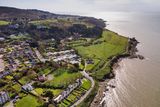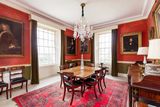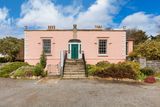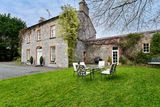Seaside home of Oscar Wilde’s mentor goes on the market for €2.5m
Greek scholar JP Mahaffy was a big influence on the poet, who stayed at his Dublin villa







Sea Lawn House
Address: Shielmartin Road, Sutton, Dublin 13
Asking price: €2.5m
Agent: Sherry FitzGerald (01) 2394022
August 1876: “I am with that dear Mahaffy every day. He has a charming house by the sea here, on a place called the Hill of Howth... the only place near town with fields of yellow gorse, and stretches of wild myrtle, red heather and ferns. Mahaffy’s book, Of Travels in Greece will be out soon. I have been correcting his proofs and like it immensely.”
Oscar Wilde took a long summer stay at the house of his tutor, friend and mentor, the notorious and brilliant Professor John Pentland Mahaffy of Trinity College. Known to his many friends and innumerable enemies as simply “Mahaffy”.
In a Dublin moving swiftly towards independence, Mahaffy was among the last of the mohicans — a trenchant southern city unionist who would not yield an inch to the coming tide. He was described as a “West Brit par excellence” and came armed with a rapier conversational wit admired by many, including Wilde.
John Pentland Mahaffy
The playwright described Mahaffy as “my first and best tutor”. When Wilde was dabbling with the idea of becoming a Catholic and taking a trip to Rome, Mahaffy travelled with him but dragged him off to Greece instead. Wilde wrote: “I never went to Rome at all. Mahaffy my old tutor carried me off to Greece with him to see Mycenae and Athens.” Wilde said Mahaffy was “the scholar who showed me how to love Greek things”.
Then Mahaffy, Trinity’s chair of ancient history (from 1871), later became college provost. Knighted, JP sucked up to aristocrats, British politicians and royalty. His regular proclamations thrilled the loyal minority as much as they inflamed the masses. Utterly enveloped in the Hellenistic world and its modicums, Mahaffy publicly produced an ancient Greek simile for every contemporary Irish spat.
He opined that Ireland, like Greece, needed a despotic government. He judged the Irish akin to Egyptians ruled by the conquering Ptolemaic Greeks, gaining the benefit of imposed civilisation.
Oscar Wilde
He skewered a charitable surge to provide shoes for Dublin’s barefoot newsboys, asserting that going barefoot as Greek boys had done was far healthier. All sides regarded him as a hopeless ‘Hellenatic’. Wilde said Mahaffy tended “to treat the Hellenic World as Tipperary writ large”.
Read more
Oscar’s tutor railed against plans for a new third-level college for Catholics (UCD) and campaigned to stop the Irish language being taught at schools: “James Joyce is a living argument in defence of my contention that it was a mistake to establish a separate university for the aborigines of this island — for the corner boys who spit in the Liffey,” he is alleged to have spouted.
The exterior of the property
Symbolically, it was Mahaffy as provost who rallied a small group of visiting Anzac troops to close the gates of Trinity against aboriginal assault from the 1916 Rising (like Spartans at Thermopylae). Mahaffy then caused bedlam when he proclaimed the Rising to be the fault of the country’s national school teachers.
But most agreed that Mahaffy had a big influence on his more famous student, in particular on the Wilde style of conversational wit for which he too became famous. But the distinguished classicist found himself by now in a new century where the importance of being earnest about ancient Greece was fading. Mahaffy died in 1919, just before his fearfully-anticipated independent Ireland came into being.
The dining room
Today, Sea Lawn, JP’s Sutton seaside villa where Wilde spent much of that summer, comes to market with a price of €2.5m. Dating from the 1820s, it is listed on the 1830’s first-ever survey map of Howth as ‘Sorrento House’. It’s located on a raised point with two acres directly looking down to the sea and over the coastguard cottages on the waterfront where there’s a beach on which local kids love to spend summer days.
The Mahaffy home wouldn’t exist today were it not for the foresight of the restoration architect Austin Dunphy, who was called to save it from demolition in 1961. At the time, it was not fashionable to save old Georgians and Sea Lawn was wholly derelict. It had been placed for sale as five sites with the divides cutting right through the unoccupied, ruined, but still roofed Sea Lawn and leaving no doubt as to its intended fate.
But one party acquired all five and pretty much expended their budget in doing so. It was Dunphy’s job to tackle the resulting restoration over 15 years on behalf of a family who recognised the home’s value but didn’t have the cash to do it all at once.
The sitting room
The original chimney pieces had been looted and a side wing of the house was out of bounds as it was ready to collapse. Initially, they lived in just a few rooms, restoring one step at a time. The children recall having a derelict lower floor to play in, writing on the bare walls and throwing dry cement at one another.
Miraculously, the beautiful ceiling stucco work in the hall (which would have been admired by Wilde), had survived. Other rooms got replicate mouldings crafted from the fallen leaves of stucco detail that could be gathered from the floor-strewn rubble. Authentic rescued chimney pieces were brought in to replace the lost versions, one from a house in Harcourt Street. Today, the house is in robust health. Accommodation spans 2,885 sq ft over two floors.
There’s the usual brace of receptions either side of the hall floor typical of the villa-style Georgian.
The entrance hall
To the left is the magnificent formal dining room and to the right is the lounge. At back on this floor is the kitchen which has modern cabinet units of a blue hue. There are four bedrooms, two of which are en suite. There’s a library downstairs and outside is a formal walled garden and a courtyard with original stable and a coach house. And inside, under the stairs, is Mahaffy’s wine cellar.
The classicist curmudgeon of old would today raise a glass of it to Dunphy and Sea Lawn’s meticulous rescue. It so happens that busybody JP is also credited with founding The Irish Georgian Society in 1908, to save colonial architecture (Greek influenced, of course) from the threat of native barbarism.
In Sea Lawn’s case at least, the barbarians were held at the gates. Sherry FitzGerald is selling the historic seaside home on two acres.
Join the Irish Independent WhatsApp channel
Stay up to date with all the latest news

























